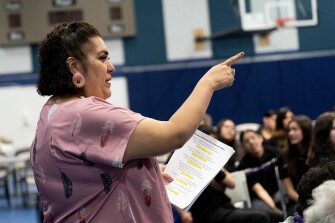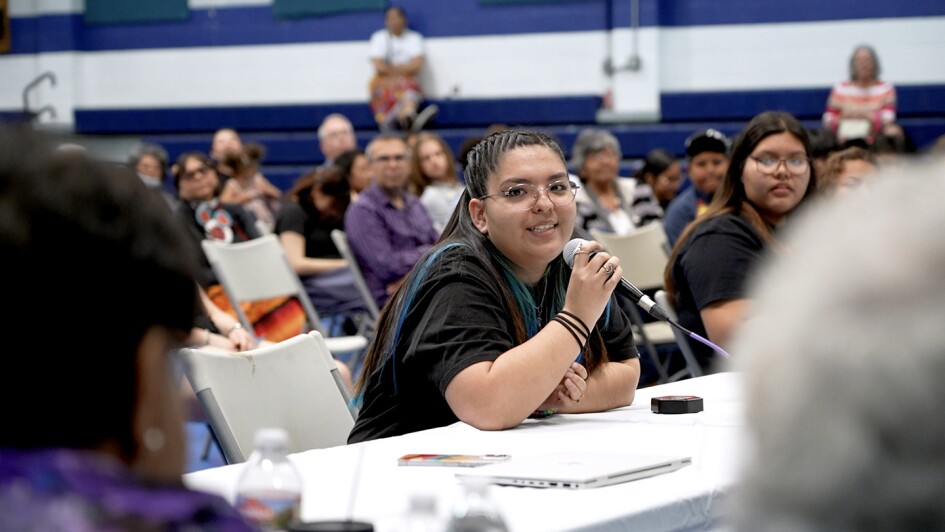When Native students are exposed to their cultural languages, their sense of well-being improves and they’re more likely to graduate, studies show. Similarly, culturally responsive teaching and curriculum have been shown to boost students’ academic achievement, motivation, and social-emotional well-being.
The Washoe County School District in Reno, Nev., started offering Northern Paiute as part of its Paiute Language Program in 2006, and recently received a grant to continue to expand that work. Northern Paiute is one of four languages indigenous to Nevada and the one most common in the Reno-Sparks area. The district was the first in Nevada to offer an Indigenous language class.
The Paiute classes fall under the 66,000-student district’s Native American Culture and Education Program, which is funded by the Title VI Indian Education Program, a federal grant given to help districts address the cultural, language, and academic needs of American Indian and Alaska Native students. In November 2022, Washoe County was selected to receive a $3.7 million grant from the U.S. Department of Education’s Office of Indian Education to further support its Native American students’ college preparation.
“For the students to be learning the language and for them to be able to share that with their families or their culture, or even come back into the school and share their families’ stories, it’s very important,” said Fawn Hunter, the district’s Indian Education Program Specialist.
“It makes me proud of the students and who they become and their growth within the classroom. I believe our communities are proud of them as well, in learning and revitalizing their language and carrying on the culture.”
Growth and Challenges
Since the program started, the district has expanded the course to three of its high schools—North Valleys High School, Reed High School and Spanish Springs High School. The schools compete in a “language bowl” at the end of the school year to test their students’ knowledge of the language, and the students engage with Paiute elders who judge the competition.

According to Hunter, one of the biggest challenges for the district’s Paiute program is fluctuating student enrollment in the classes. At Spanish Springs High School, the course is so popular the school is splitting it into two classes to meet demand. Finding the classroom space to make it available took some work. At Reed High School, interest has remained steady over the year. But the class at North Valleys is moving to another district high school, Wooster High School, for the 2023-24 school year due to low enrollment.
Though the class is open to all students, the district has tried to encourage its Native American students to enroll. Approximately 1 percent of Washoe County students are Native American and they make up less than half of the students taking Paiute language classes, according to Hunter.
“We’re happy to see those numbers. We just need to make sure that we’re promoting it more so our Native students know that it’s available to them as well,” Hunter said. “I believe it’s important for them to have the Native language programs. It’s a big part of who they are, and I feel like we’re embracing part of who they are in order to offer that to them.”
In order to provide the classes, Washoe County also needs Paiute teachers, and finding them has presented some challenges, in part because the number of fluent speakers is small and those available to teach in the classroom is even smaller.
But for Macario Carrillo-Mendoza, one of Washoe County’s new Paiute language specialists, teaching students is the culmination of years of knowledge.
“What I teach is what the elders taught me,” Carrillo-Mendoza said. “We’re promoting it in the schools. We’re putting it out in the public, you know? We’re showing the elders that the youth are being taught something, that they’re learning … [It’s] kind of a gift from the elders, right? They give you something that they want you to pass on, and our job should be to continue it.”
The Washoe County language program is part of a wider effort to revitalize Northern Paiute as a language and preserve and share its speakers’ culture. Collaboration with the Reno-Sparks Indian Colony, a federally recognized tribal government, was essential to not only implementing it within the district, but also establishing it as a world language credit class, a graduation requirement for students.
The partnership goes further into the classroom as well, as elders and other community leaders teach students lessons on basket weaving, beadwork, and roasting pine nuts as part of the curriculum.
Cultural touchstones and community engagement are important aspects of the Washoe County School District’s classes and what Hunter points to as necessary for other districts looking to create their own language classes.
The demand for Indigenous language programs in Nevada is growing. Hunter has spoken with the Clark County School District in southern Nevada about how to create a Navajo language program, as Navajo is the dominant Indigenous language in the Las Vegas area. Other districts have started new Paiute programs of their own. McDermitt Combined Schools in Humboldt County and Yerington High School in Lyon County are both in the first year of their own classes.
“The advice I have for other programs or other districts that want to create a program such as this is definitely reaching out to the Native community that’s closest to them,” Hunter said. “I think that’s very important to include the communities.”






